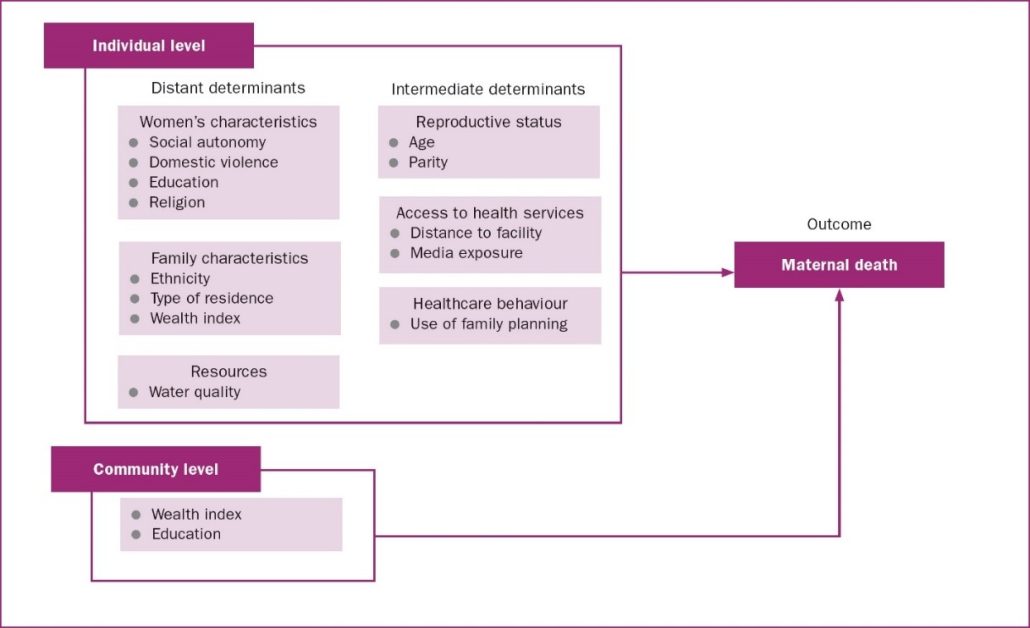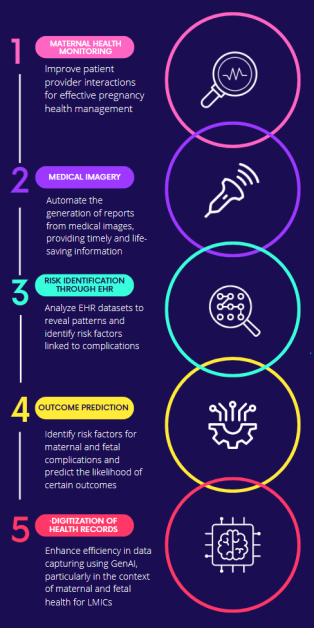
A Writer’s Guide for AI-Enhanced Content Creation
December 20, 2023
2023 Wrapped: Year in Tech
December 31, 2023From Disparities to Solutions: AI’s Impact on Maternal Health Outcomes
In the realm of maternal care, the focus is on safeguarding the health and well-being of expectant mothers throughout the entire journey of pregnancy, childbirth, and the postpartum period. Maternal care encompasses various services, including regular check-ups, prenatal screenings, access to healthcare professionals, and guidance on nutrition and exercises. The goal is to provide comprehensive assistance to women, ensuring a smooth transition into motherhood.
Addressing women’s health is a crucial but often overlooked aspect of global healthcare, and this holds particularly true in Low and Middle Income Countries (LMICs) like Pakistan. Despite comprising more than half of the country’s population, women’s health research has historically lagged. While there has been a gradual decrease in maternal mortality rates, Pakistan faces obstacles hindering the achievement of its goals. Challenges such as a shortage of skilled healthcare professionals, insufficient facilities, limited educational resources, and societal constraints present significant barriers to improving maternal health and reducing maternal mortality. The situation is exacerbated in rural areas, where poverty and widespread ignorance compound these challenges.
Maternal Healthcare in Pakistan
The landscape of maternal healthcare in Pakistan is marked by stark disparities in access, awareness, and outcomes. According to a recent survey, a mere 39% of women in rural areas have access to skilled healthcare assistance during childbirth, a figure significantly lower than the 61% in urban centers.
Approximately 26% of rural women receive no antenatal care during pregnancy, missing out on vital early interventions. ‘Pakistan Maternal Mortality Survey 2019’ conducted by the National Institute of Population Studies funded by USAID shows considerable demographic variations in maternal mortality rates of women residing in rural and urban areas of Pakistan. The maternal mortality ratio in Pakistan is 154 deaths per 100,000 live births which is a significant upward trend compared to 140 deaths per 100,000 live births in 2017. The ratio is nearly 26% higher in rural areas as compared to urban areas.
In Pakistan, approximately 96% of women with education received prenatal care from a doctor, compared to 50% of women without education. A third of pregnant women in Pakistan do not seek prenatal care specifically because it is deemed unnecessary or more importantly, too expensive. This warrants concern as prenatal care can reduce the rates of complications and maternal mortality.
Preventable Complications
Let’s do a critical examination of preventable complications which pose significant challenges that demand urgent attention. These complications, ranging from high blood pressure (hypertension) to gestational diabetes, infections acquired during pregnancy, preterm deliveries, and the profound impact of miscarriages, underscore the need for targeted interventions and robust healthcare strategies:
- High Blood Pressure (Hypertension):
High blood pressure during pregnancy hampers the efficient transportation of blood, potentially causing issues like swollen nerves or narrowed arteries. It increases the risk of stunted fetal growth, premature delivery, and preeclampsia, heightening risks for both the mother and baby.
- Gestational Diabetes:
Diabetes, affecting individuals regardless of age or gender, becomes particularly critical during pregnancy. Diabetic women face an elevated risk of complications, including miscarriage, renal failure, cardiovascular diseases, blindness, and other long-term illnesses.
- Infections Acquired during Pregnancy:
Pregnancy weakens the woman’s immune system, making her susceptible to infections that can potentially spread to the fetus. Vigilance and preventive measures are essential to safeguard both maternal and fetal health.
- Preterm Deliveries:
Preterm deliveries can result in infants with various health issues. The final stages of pregnancy are crucial for the brain and immune system’s development, and premature birth can pose challenges for the infant’s overall well-being.
- Miscarriage or Loss of Fetus:
Miscarriage, the natural loss of pregnancy, is a challenging reality, with over 20% of pregnancies ending in miscarriages. These events occur early in the pregnancy and emphasize the need for supportive care and understanding for women facing such losses.
Factors Affecting Maternal Care
Addressing these complications requires a holistic approach, including regular prenatal care, timely screenings, and awareness initiatives. Supporting expectant mothers through these challenges is essential for ensuring the well-being of both mothers and their infants.
The Three Delays Model, proposed by Thaddeus and Maine in 1994 provides strategic guidance for reducing maternal mortality by focusing on three key approaches.
- Reducing the chances of women becoming pregnant when unintended.
- Decrease the likelihood of women experiencing complications during pregnancy.
- Improving outcomes for women who do encounter complications.
The research has established that by addressing these aspects, there is high probability to achieve overarching goal of minimizing maternal mortality, considering the multifaceted determinants at play.

Let’s take a deep look at what are the main factors keeping women away from proper medical facilities:-
- Deciding to Seek Healthcare:
Women’s delay in seeking necessary healthcare often stemmed from a lack of empowerment and autonomy. Cultural norms dictated that women waited for their husbands to make decisions regarding medical care during pregnancy. The lack of authentic and accessible means to take medical advice regularly without physical displacement further aggravates the lack of attention and medical care.
- Reaching an Appropriate Obstetric Facility:
The geographical distance from participants’ homes to healthcare facilities posed a significant challenge, making it difficult for many women to access proper care. Consequently, some women resorted to home remedies and nearby birth attendants instead of seeking medical facilities.
- Receiving Adequate Care:
Challenges in receiving adequate care included the unavailability of oxygen in emergency wards, insufficient supplies, and a shortage of qualified healthcare providers. Birth attendants often lacked the necessary knowledge, skills, and equipment for safe deliveries. Additionally, there was a lack of emergency care for high-risk pregnancies, and postpartum care for mothers and infants was observed to be suboptimal in some places.
- Lack of Education & Awareness:
Limited awareness about the importance of prenatal and postnatal care, as well as family planning, can lead to a lack of motivation to seek medical assistance. Without sufficient awareness, pregnant women may underestimate the potential risks associated with inadequate prenatal and postnatal care.
- Fear and Stigma
Fear of judgment may lead women to delay seeking maternal health services, including prenatal care. This hesitation may prevent women from openly discussing their health concerns, lifestyle, or previous medical history with healthcare providers.
- Adequate Healthcare Facilities:
Access to maternity services is impacted by various factors such as high staff turnover, wastage of resources, and concerns about healthcare professionals’ ability to build rapport with patients were reported. Women expressed fear of mistreatment by nurses, especially if they had been unable to attend antenatal care before hospital visits.
To overcome these varied challenges, strategies should be designed to dismantle barriers across multiple levels, creating an inclusive environment where the potential of AI can be harnessed to aid in addressing these challenges.
AI and ML for Maternal Health
A high percentage of complications can be prevented by the use of technology in facilitating access to health services and timely availability of right information. These preventable complications not only lead to doctor burnout but also incur financial losses for hospitals, and higher treatment costs for the patients. AI and ML based solutions can overcome the social and geographical barriers by early detection of these complications or predicting the outcomes. These advance models can not only provide guidance for the women during the course of pregnancy but can also support the overloaded healthcare staff in managing patients health track and taking timely decision to prevent any negative outcome.
Lets discuss a few use cases where AI can assist in preventing a substantial percentage of these complications.

- Maternal health monitoring is a critical aspect of ensuring the well-being of both the mother and the developing fetus throughout the stages of pregnancy. Various changes occur in the mother’s body during pregnancy, underscoring the importance of vigilant monitoring for signs and symptoms indicating any disruptions in normal functioning.
- Wearable sensor-based technologies and ML approaches have the potential to improve patient provider interactions for effective pregnancy health management, thus replacing the traditional healthcare settings with a high positive rate.
- Very low cost solutions using IoT based sensors can be developed to keep track of vital health markers and generate a patient profile. AI based solutions can use this data to provide real time guidance to patients as well as generate alarms for health care providers for timely reaction.
- Medical Imagery
The World Health Organization recommends at least one ultrasound scan before 24 weeks of gestation for pregnant women to evaluate gestational age and improve detection of fetal abnormalities with greater confidence. However, it requires trained staff to understand how to scan properly and correctly in order to make the right image interpretations which is a significant challenge in LMICs like Pakistan especially in rural areas.
- By using AI to analyze ultrasound images, healthcare providers can improve the accuracy of diagnoses and detect abnormalities that may otherwise be missed. By leveraging latest AI driven imaging techniques, development of handheld devices is possible which can enable healthcare workers to scan and get an automated ultrasound report. With the automated AI capabilities, healthcare workers can identify abnormalities earlier, helping to increase confidence and comfort of the mother in any decisions or care pathways.
- In areas where skilled personnel for image interpretation are scarce, AI can automate the generation of reports from medical images, providing timely and life-saving information directly to the mother. Weeks of training for midwives can be reduced to hours, without negatively affecting confidence in triage.
- AI can enable the acquisition and interpretation of crucial information from ultrasound scans, such as head measurements for determining the fetus’ age, even in the absence of a specialist. These systems can also generate a large image dataset from ultrasounds, training AI modules to recognize normal measurements for specific ages and allowing the AI to suggest deviations from the norm. This approach has the potential to significantly improve maternal healthcare, especially in low resource rural communities.
- Risk Identification through EHRs
Generative AI are set to play a pivotal role in streamlining intricate Electronic Health Records (EHRs), offering valuable perspectives on patient health, and enhancing the efficiency of maternal care.
- EHR Data Extraction. Generative models can analyze Electronic Health Record (EHR) datasets to reveal patterns and identify risk factors linked to complications such as preeclampsia, gestational diabetes, and preterm birth. As a result, these cutting-edge systems provide essential information on the well-being of expecting mothers, facilitating prompt interventions and ultimately leading to improved maternal health outcomes.
- Patient Profiling. Generative AI systems can analyze social determinants of health and pinpoint patients at elevated risk of adverse maternal outcomes due to factors such as poverty, transportation constraints, or inadequate housing. This supplementary understanding empowers healthcare providers to customize their care, specifically addressing these unique challenges.
- Personalized Care/ Followups. These systems can additionally enhance communication between patients and providers by facilitating virtual consultations for pregnancy-related queries or post-delivery follow-ups. These interactions can be processed by the generative models to forecast patients who might miss appointments or encounter challenges with treatment adherence. This enables healthcare providers to recognize and assist those in need of extra support in managing their care.
- Outcome Prediction
By analyzing large amounts of medical data, AI algorithms can identify risk factors for maternal and fetal complications and predict the likelihood of certain outcomes. For example, accurately predicting the birth weight of a newborn using features of the mother would enable health workers to take remedial measures. Similarly, utilizing data from the EHRs, a “labor risk score” can be computed using machine learning, aiming to provide individualized information as an alternative to conventional labor charts.
Tied to individual patients, this predictive score can guide the providers toward early interventions or allow more time for transferring patients residing farther from hospitals to receive better care. AI models offer an alternative to current practices, departing from the uniform margins set by labor charts and promoting individualized clinical decisions based on the baseline and labor characteristics of each patient.
- Digitization of Maternal and Fetal Health records
AI can introduce a transformative approach to enhance efficiency in data capturing, particularly in the context of maternal and fetal health for LMICs. Leveraging advanced algorithms, such as audio transcription, the models can streamline the process of recording and analyzing crucial healthcare information. For instance, utilizing audio transcription algorithms can enable healthcare professionals to effortlessly convert spoken information, such as patient consultations or medical records, into accurate and accessible text. This not only expedites data entry but also reduces the risk of errors associated with manual input. AI-driven data capturing method can offer a significant advantage. By automating this process, healthcare providers can dedicate more time to patient care and decision-making, ultimately contributing to improved outcomes for both expecting mothers and their infants.
Challenges in Adoption of AI based Tech
While the adoption of AI for maternal health in Pakistan holds tremendous potential, several challenges must be navigated to ensure effective implementation. Some of the key challenges include:
- Limited Access to Technology:
In rural Pakistan, the absence of robust internet connectivity poses a significant hurdle to the seamless functioning of AI applications. Limited or intermittent access to the internet inhibits the real-time transmission of data, essential for AI algorithms to operate efficiently. This constraint is particularly crucial for applications that rely on cloud-based processing and data exchange, hindering the potential benefits of AI in remote healthcare settings. Addressing these infrastructure-related challenges requires a comprehensive approach that goes beyond the development of AI algorithms. Initiatives aimed at bolstering the overall technological ecosystem in rural areas, including improvements in internet connectivity, provision of necessary hardware, and sustainable energy solutions, are imperative.
- Healthcare Infrastructure:
In many healthcare facilities across Pakistan, particularly those situated in rural settings, a pervasive challenge stems from a marked scarcity of essential resources for AI solutions to work. These limitations pose a daunting barrier to the seamless integration of AI into the healthcare landscape, necessitating substantial infrastructural upgrades. By investing in the necessary upgrades, providing targeted training programs, and fostering a conducive environment for change, healthcare facilities in rural Pakistan can overcome these hurdles and unlock the transformative potential of AI for maternal health.
- Cultural and Societal Factors:
The influence of cultural and societal norms on the acceptance of AI technologies is profound. Traditional practices, familial expectations, and the reliance on interpersonal relationships within communities can impact how new healthcare interventions are received. Maternal care, being a culturally sensitive and intimate aspect of women’s lives, is particularly susceptible to these influences.
Building trust and awareness within communities is a critical step in overcoming potential resistance to AI adoption. This involves an ongoing dialogue and educational initiatives that address cultural concerns and misconceptions about AI in maternal health.
- Cost Implications:
The upfront costs associated with implementing these technologies can serve as a significant barrier to widespread adoption. The financial considerations encompass the development, installation, and maintenance of AI-driven solutions, which may include sophisticated algorithms, data storage systems, and continuous technical support.
To overcome this hurdle, it becomes imperative to design AI solutions that are not only effective but not cost-intensive. This involves streamlining development processes, leveraging open-source technologies, and exploring collaborative initiatives with public and private sectors to pool resources.
Conclusion
The integration of AI into maternal health initiatives in Pakistan holds immense promise for transforming the landscape of maternal care. While challenges such as limited access to technology, healthcare infrastructure gaps, and cultural considerations persist, the potential benefits are significant. Efforts must be directed towards overcoming barriers, ensuring technological literacy, and establishing robust regulatory frameworks. Moreover, a commitment to affordability and inclusivity is paramount to democratize access to AI-driven maternal health solutions, especially in economically disadvantaged and rural areas.
About the writer: Dr. Usman Zia is an Assistant Professor at the School of Interdisciplinary Engineering and Sciences (SINES), National University of Sciences and Technology (NUST), Pakistan. His research interests are Generative AI, Large Language Models (LLM), Natural Language Processing (NLP), and Machine Learning. He has authored numerous publications on language generation and machine learning. As an AI enthusiast, he is actively involved in numerous projects related to on-premises domain specific LLMs, Retrieval Augmented Generation (RAG) and Information Retrieval.






